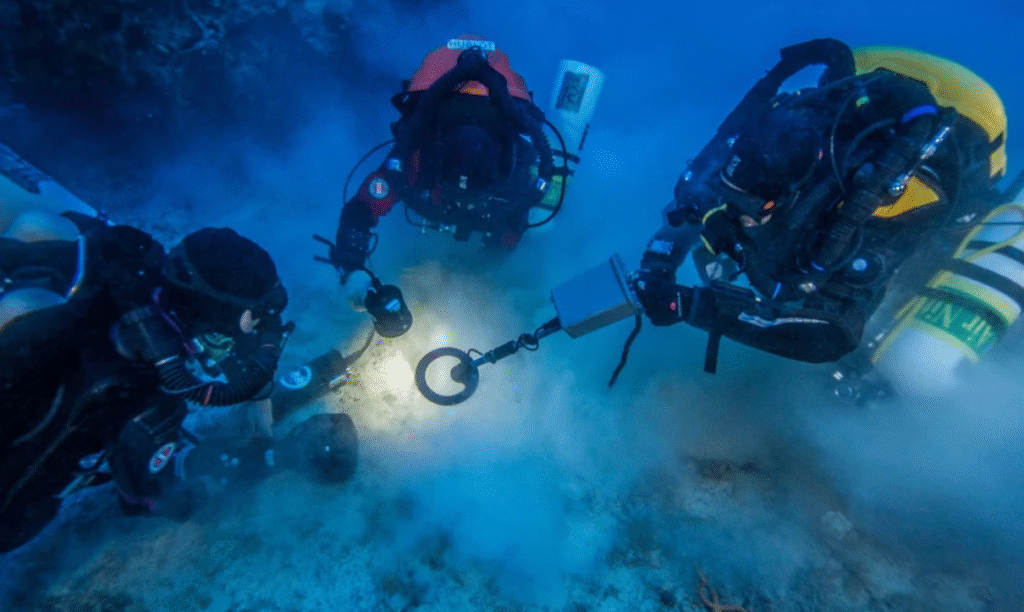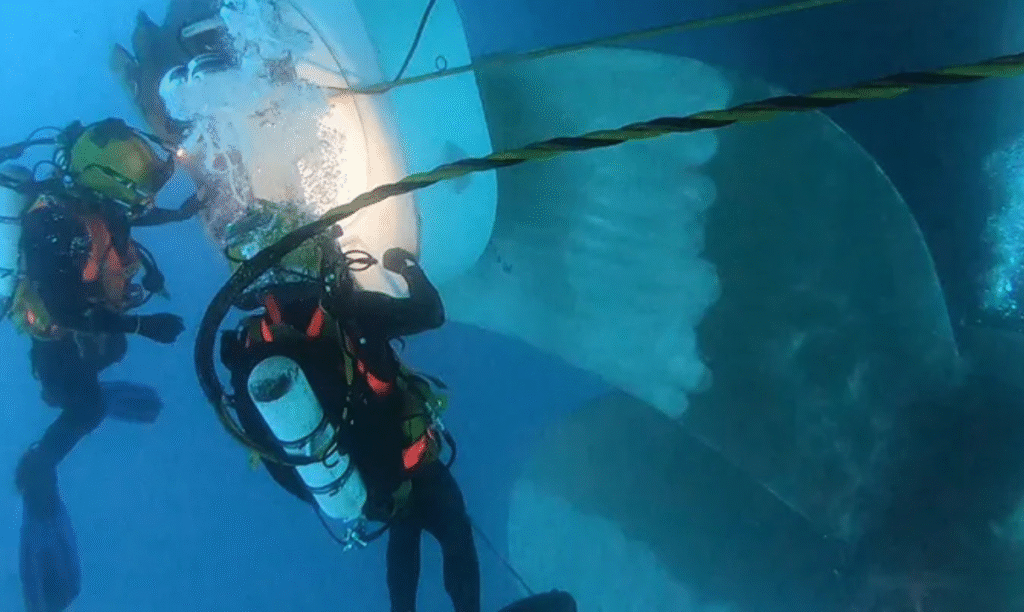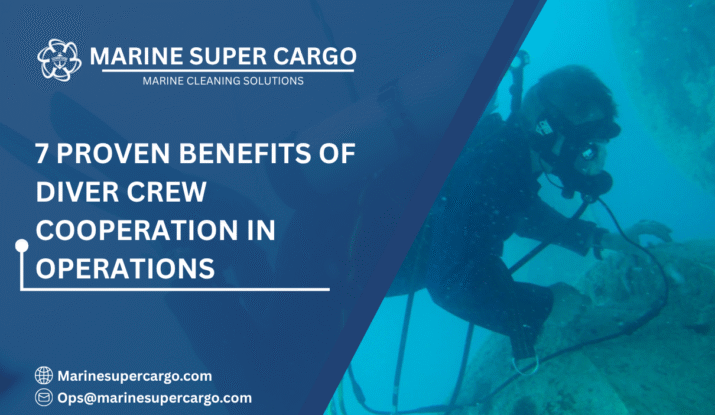A ship is often compared to a floating city, where every crew member plays a vital and interconnected role to keep operations running smoothly. When it comes to underwater tasks such as hull cleaning, propeller inspections, or emergency repairs, the focus naturally shifts below the surface to professional divers.
However, divers cannot work in isolation—their success and safety depend heavily on the coordinated support of the crew on deck. This seamless teamwork is known as diver crew cooperation. It ensures that communication flows clearly, equipment is handled efficiently, and emergency protocols are followed without delay.
Without such cooperation, even the most skilled divers face heightened risks, wasted time, and compliance challenges. Strong diver crew cooperation not only enhances safety but also drives efficiency, protects the marine environment, and ensures sustainable ship operations across global waters.
Why Diver Crew Cooperation Matters
Imagine a diver underwater, focusing on cleaning thick layers of marine growth. Suddenly, the vessel shifts slightly because the crew didn’t coordinate ballast adjustments. That small gap in communication could lead to disaster.
Diver crew cooperation matters because:
- It saves lives by avoiding miscommunication-related accidents.
- It boosts efficiency in tasks like hull cleaning and propeller inspections.
- It ensures compliance with international safety and environmental frameworks such as IMCA and IMO.
- It minimizes costs by reducing operational delays and equipment misuse.
In short, diver crew cooperation is the foundation of smooth and predictable underwater work.

Core Elements of Diver Crew Cooperation
Strong diver crew cooperation doesn’t happen by accident. It is built through conscious practices:
- Clear Communication – Using standardized hand signals, radios, and established protocols between divers and bridge crew.
- Defined Roles – Crew know their responsibilities, whether monitoring air supply lines, stabilizing the vessel, or managing ballast.
- Safety Culture – Everyone treats diver safety as paramount, making it a shared mission rather than one person’s task.
- Situational Awareness – Crews understand how their actions on the surface—like engine running or anchor movement—directly impact divers below.
Without these principles, operations drift into unpredictability.
Lessons from Past Incidents
Maritime history gives us critical reminders of the consequences of poor diver crew cooperation.
- Case of Equipment Mishandling
Faulty communication caused a diver’s air hose to tangle during hull cleaning, resulting in near-fatal decompression sickness. - Ballast Adjustment Error
Sudden unplanned movement during a port stay endangered divers working underwater. This accident directly emphasized coordination.
From such tragedies, the industry learned that diver crew cooperation needs the same rigor as navigation or cargo handling.
Regulatory and Compliance Aspects
International regulations stress diver crew cooperation as a compliance necessity:
- IMCA Guidelines – Outline competence and teamwork standards for safe diving operations.
- MARPOL Convention (Marine Insight – MARPOL) – Emphasizes eco-safe waste collection, which requires crew-diver synchronization during hull cleaning.
- IMO Safety Practices – Stress communication systems and documentation for underwater work.
- Port Authority Regulations (iaphworldports.org) – Increasingly demand transparent diver-crew coordination records for eco-sensitive zones.
So, diver crew cooperation isn’t just about operational success—it’s about passing inspections, avoiding detentions, and staying on the right side of international law.
Practical Applications Onboard
To bring diver crew cooperation to life, shipowners and operators should emphasize:
- Pre-dive briefings where both crews and divers map out roles.
- Use of checklists before operations (e.g., air supply, ballast stability).
- Assigning surface support teams for emergencies.
- Keeping real-time monitoring of the diver’s location and condition.
These steps are like rehearsing a well-coordinated orchestra—when everyone plays the right note, the result is harmony.
Benefits of Effective Diver Crew Cooperation
When cooperation works, the rewards are undeniable:
- Fewer accidents and near-miss events.
- Less downtime during vessel inspections and hull cleaning.
- Improved efficiency due to seamless communication.
- Higher compliance with IMCA/IMO standards and port requirements.
- Positive reputation with stakeholders and insurers.
Each benefit compounds into cost savings and operational trustworthiness.
✅ 4 Things to Check for Safety at Sea pic.twitter.com/dAxhJQ2i6U
— Marine Super Cargo (@Marinsupercargo) September 14, 2025
Challenges in Building Cooperation
Of course, cooperation doesn’t always come easily. Barriers include:
- Language differences between international crews.
- Lack of standardized training or protocols.
- Crew fatigue leading to lapses in concentration.
- Overconfidence—assuming “routine jobs” don’t need careful cooperation.
These challenges highlight why training and culture are as critical as technical tools.
Best Practices for Stronger Cooperation
Industry experts recommend embedding diver crew cooperation into daily culture:
- Conduct quarterly training on diver-crew collaboration.
- Use multiple communication redundancies (visual, audio, digital).
- Rotate crew roles so understanding deepens across functions.
- Partner with certified diver service providers.
When best practices take root, diver crew cooperation becomes automatic—like second nature.

Future of Diver Crew Cooperation
The maritime future will lean on tech to make cooperation even safer:
- AI-driven dashboards to track diver positions and environmental conditions.
- Augmented reality (AR) helmets showing crews real-time diver feedback.
- Automation in redundant life-support monitoring.
- Blockchain records ensure transparent documentation of operational cooperation.
These tools will make diver crew cooperation not just safer but smarter.
Conclusion
Diver crew cooperation is more than just a procedural checklist—it is the silent force that underpins safe, efficient, and compliant ship operations. When divers and crew members work hand in hand, risks are minimized, communication is clear, and every operation becomes more controlled and reliable.
This cooperation strengthens safety standards, reducing the chances of tragic accidents that could endanger lives and disrupt schedules. It also boosts efficiency, ensuring hull cleaning, inspections, and underwater repairs are completed smoothly, saving both time and resources.
Just as importantly, it helps vessels maintain strict compliance with IMCA, IMO, and port authority regulations, avoiding costly fines or delays. In the end, diver crew cooperation is not an optional practice but a cornerstone of sustainable maritime operations—protecting people, preserving assets, and supporting environmental responsibility.
For eco-compliant, safe, and efficient hull cleaning supported by professional divers, visit CleanShip.co.
FAQs:
Q1. What is diver crew cooperation?
It is the coordination and teamwork between the onboard crew and divers during underwater operations, ensuring safety, compliance, and efficiency.
Q2. Why is diver crew cooperation essential?
It prevents miscommunication-related accidents, boosts performance, and ensures smooth compliance with IMO, MARPOL, and IMCA standards.
Q3. What challenges affect cooperation?
Language barriers, fatigue, poor training, and overconfidence often disrupt effective diver-crew coordination during operations.
Q4. How can cooperation improve compliance?
By ensuring clear documentation of cleaning, inspections, and operations, meeting IMO and port authority expectations becomes seamless.
Q5. What’s the future of diver crew cooperation?
Expect AI, AR communication tools, and blockchain documentation to elevate coordination, making underwater operations safer and smarter.


